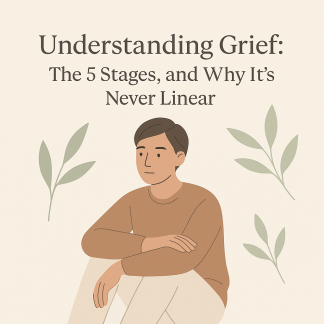Understanding Grief: The 5 Stages, and Why It’s Never Linear
By Jon Rowe | Relational Psychotherapy
Grief affects every part of us — emotionally, physically, relationally. It can show up at work, in social settings, and in the quietest moments of everyday life. One moment you might feel numb, the next angry, and then suddenly overwhelmed with sadness. The truth is, there’s no one-size-fits-all experience of grief.
At Relational Psychotherapy, I often work with clients navigating loss — of a loved one, a relationship, or a way of life. Understanding the five stages of grief, as originally described by Elisabeth Kübler-Ross, can help give shape to an otherwise shapeless emotional experience. But it's crucial to remember: grief isn’t linear, and there’s no "right" way to grieve.
Grief vs Bereavement
While the terms grief and bereavement are often used interchangeably, they describe different aspects of loss. Bereavement refers to the period following a loss — particularly the death of someone close — and encompasses the broader circumstances of that loss, including its practical, relational, and emotional impact. Grief, on the other hand, is the internal emotional response to that loss — the sorrow, confusion, anger, and yearning that can arise. Understanding the difference between these two concepts can help us better name and navigate our own experience, as well as offer more compassionate support to others.
The Five Stages of Grief
-
Denial
This is our mind’s initial defence mechanism: “This isn’t really happening.” It’s a visceral, unconscious response to overwhelm. Denial can cushion the impact and buy us time to adjust to a painful reality. -
Anger
Often misunderstood, anger is a natural part of grief. It can surface as “Why did this happen?” or get misdirected at others, including those also grieving. Anger can also emerge when others don’t grieve in the way we expect them to. -
Bargaining
In this stage, we might find ourselves thinking, “If only they can make it to the wedding…” or “Maybe if we try another doctor…” This stage can be deeply emotional and full of “what ifs,” as we wrestle with the idea of finality. Sometimes, people turn to spirituality or mediums in the hope of reconnecting, especially when closure feels just out of reach. -
Depression
Reality sets in. We feel the weight of loss, the emptiness, and the sadness. Importantly, grief-related depression isn’t necessarily a mental illness — though it can sometimes evolve into one if left unacknowledged. It’s a natural part of integrating the loss. -
Acceptance
This isn’t about feeling okay with what happened — it’s about acknowledging the reality and beginning to find meaning again. For many, this stage brings a shift in values — choosing to live more fully, prioritise loved ones, or give back through volunteering or advocacy.
You Don’t Have to Go in Order
Kübler-Ross initially presented these stages as linear, but grief is anything but. People often skip stages, revisit them, or move through them in waves. You might be in acceptance for months, then feel angry all over again on an anniversary or special occasion. That’s normal.
Sometimes, grief begins before the loss itself — especially when someone we love has a terminal illness, or when we sense a relationship is ending. This is called anticipatory grief. It can prepare us emotionally but may also rob us of fully living in the present with our loved ones.
There’s No Right Way to Grieve
One of the most damaging myths about grief is the idea that there's a correct way to do it. Grief can be quiet, loud, delayed, immediate, emotional, or completely numb. You might cry every day or never at all. You might seek connection, or you might retreat. All of it is valid.
Sometimes grief is delayed — when life is busy or responsibilities take over. I’ve worked with clients who’ve experienced grief emerging years after a loss. This, too, is part of the process.
A Personal Note on Grief
In my own life, I’ve had to sit with grief that didn’t make sense on paper — grief that didn’t follow the rules. As a therapist and a person, I know how important it is to normalise this experience. There is no timeline. No finish line. And most importantly, no shame in where you are right now.
If you're navigating loss — recent or long ago — I offer a warm, supportive space to make sense of it all. At Relational Psychotherapy, grief is not something to “get over,” but something to move through, with compassion, gentleness, and support.
Love & Light
Jon
If this resonates, you're not alone. I’m here to help you process your grief in a way that feels right for you.
📍 In-person in Plymouth or 🌍 online across the UK.
📩 contactjonrowe@gmail.com
🌐 www.jon-rowe.com

